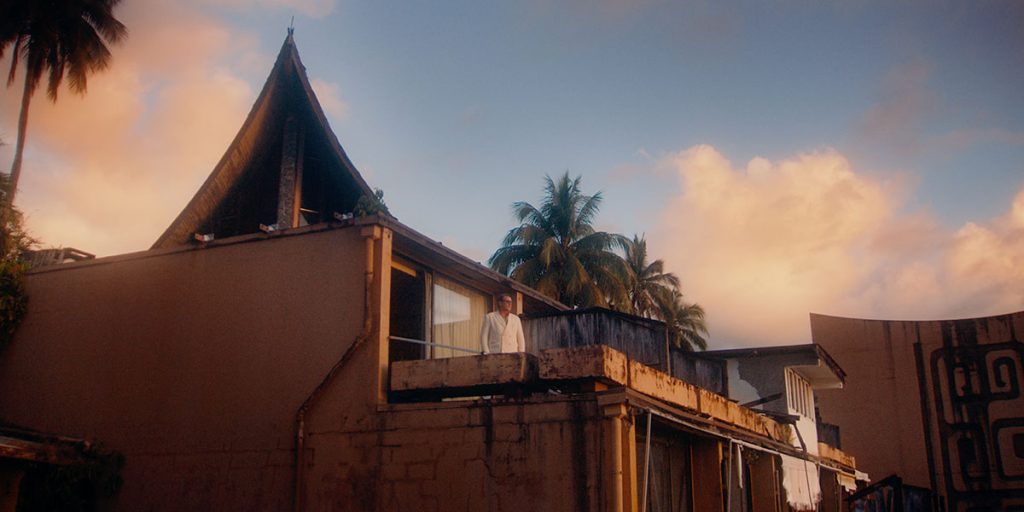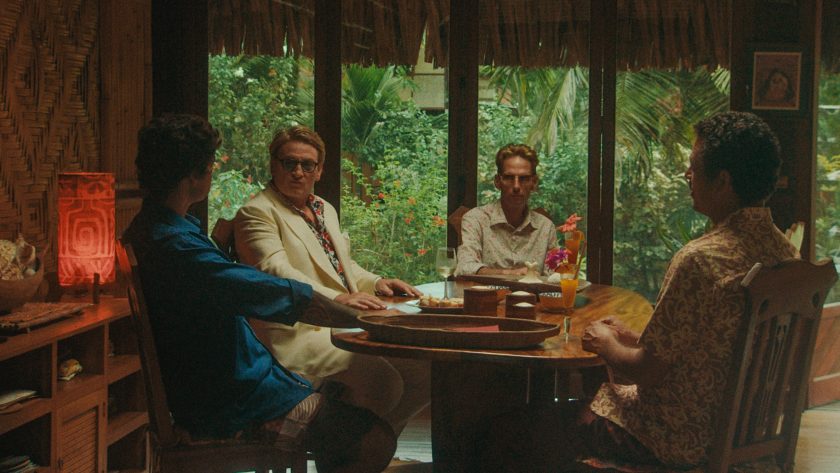BFI’s London Film Festival is in town! The FilmSoc Blog is back for the 66th edition of the city’s largest film festival, delivering a look at the hits and misses of the 2022-23 season.
◯ Warning: this review contains spoilers.
Aryan Tauqeer reviews Albert Serra’s newest epic set on the French Polynesian island of Tahiti.
‘exploiting as much as judicious the resources of our own indigenous conceptual schemes in our philosophical meditations…’ (Kwasi Wiredu, Conceptual Decolonization in African Philosophy)
In Albert Serra’s latest portrait of excess and institutional rot, the manifestation of the latter takes a less apparent form than in the debauched Liberté– there are few obvious signifiers of venereal collapse, nor are there clear trails of decay in the form of bodily fluids. An ostentatious French avatar of said decay persists- though, unlike Louis XIV, the French High Commissioner De Roller (Benoît Magimel) is defined less by his fallibility than by his seemingly all-encompassing tendrils of social influence, not to mention a certain joie de vivre that is uncharacteristic for a bureaucrat. Strolling through the white sands of French Polynesia with the swagger of a man with all the time in the world, De Roller moves through a series of spaces where power is exchanged and converted from hollow reassurances to loaded threats- the film opens with him lounging under the blue strobes of a nightclub, as the sunglasses that seem practically sewed to his face project a perpetual image of good-naturedness. The Paradise club exists, at least to the Frenchmen that occupy it, as a veritable fluorescent oasis in the midst of French Polynesia. As the film cuts to De Roller visiting a meeting of Indigenous leaders, there exists a persistent, termitic discomfort- we are assured by the bureaucrat dressed like a Miami Vice extra that nuclear testing ended long ago. His stark white suit acts as an armour of affability, concealing his barely-disguised condescension towards rising political firebrand Mahati (Mahati Pambrun), explaining that the investment required to restart the French nuclear testing program near Tahiti could never be recouped, and so logically, why would it ever be restarted? His language is couched in soothing rationalism, which is also how Pacifiction articulates itself as a text on neon-drenched neo-colonialism. It proceeds along a continuum of disparate vignettes, where political alliances undergo paradigm shifts wordlessly, and where the threat of nuclear apocalypse expresses itself as the faint magenta hue of the tropical sky. It is precisely this reservedness that renders Pacifiction so multitudinous in its implications- glacial it may be, but in its languid pans across landscapes industrial and natural, the film betrays a potent paranoia of the hauntological colonial entity rearing its ugly head.

In its droning nightclub sequences and its stark cuts to gorgeous island vistas, the editing team (which, in addition to regular Serra collaborators Ariadna Ribas and Artur Tort, includes Serra himself) creates an- as passé as this will sound- almost hypnotic rhythm, whereby De Roller’s smooth-talking lures audiences towards the precipice of coalescence with colonial aims. It is tempting to locate Serra’s film in a wider paradigm of neon-splattered colonial ventures following the trail of carnage led by a single marauder (particularly Apocalypse Now and Only God Forgives), but the effect of the film’s languorous pacing is much closer to the vision of interminable modernity Akerman conjures in Jeanne Dielman, 23 Commerce Quay, 1080 Brussels. As in Akerman’s film, tension manifests not in multiple shifts in state of being but in the prolonging of mundanity- key spatial lynchpins of power are visited in cycles that are calculatedly meandering, introducing slight alterations each time they are visited. Even the accumulation of these details that builds up to a sort of anti-catharsis do not manifest in ways that are immediately noticeable, often obscured under layers of pleasantries that act as silencers on the linguistic instruments of conquest exercised by De Roller. Though Serra’s deeply reserved direction restricts any release of this tension, there is a certain macabre glee in how De Roller’s façade of gregariousness slowly sheds to give way to something deeply sinister; in a meeting that seemingly bears no significance to De Roller but which represents a paradigm shift for the Indigenous residents of Tahiti, a tone of venom creeps in over the bureaucrat’s breezy assurances- Mahati’s insistence on referendums provokes in De Roller the assertion of formal, structural power in place of the power afforded by social influence. Snapping with the temperament of a man who does not expect to be questioned, he tersely remarks that his experience qualifies him to speak the final word.
This is not to suggest that the film is didactic in its staging of neo-colonial exploitation- De Roller may be an ostentatious figure, but his outsized personality never veers on the cartoonish, nor is the flow of power unidirectional. Pacifiction opens with a pan across the apparatuses of globalization- Maersk containers, cranes and freights- superimposed against the warm horizon, thereby establishing the film’s rendition of French Polynesia as not merely a spatialization of colonial psyche, but as an arena of multidirectional material relations. Take the role played by Shannah (Pahoa Mahagafanau), a Polynesian trans woman who serves, in transient capacities, as both De Roller’s assistant and his emissary. As rays of fluorescent light tear through the artificial mist in Paradise, she choreographs in another room of the club a troupe of theatrical thespians, who enact a traditional silent diorama. With De Roller’s intrusion into this space, however, a silent performance is punctuated by the shrill caw of a rooster- animistic costumes and actions are not enough, for in order for the colonial presence to derive the requisite pleasure that necessitates the performance to be enacted in front of them, it must be interspersed with cockfighting to “throw in some violence” as though playing the role of an especially pugnacious director. Just as the performance is fragmented by the arbitrary inclusion of a cockfighting match, Shannah’s role becomes fragmented by De Roller’s elevation of her to a muse, an encapsulation of everything he finds entrancingly exotic. Like the waves that gradually increase in size throughout the film, De Roller’s tendrils extend through every aspect of government, a radioactive leak that eventually begins to poison even the French colonials that benefit from his activities. By the time De Roller visits Paradise for seemingly the last time, the club is almost entirely empty- only the glow of two fluorescent jockstraps illuminate the room, a farcical summation of everything his efforts have led to.

In a post-screening Q/A, Serra admitted that whilst some research was performed on the Polynesian islands the film was shot in- primarily through the recording of more than 500 hours of footage- an accurate recreation of the political dynamics of the region was never the film’s intent, nor was it ever intended to be a film about colonialism. It might be presupposed that this softens the piercing quality of the film’s political subtext, but through an assemblage of audiovisual signifiers of the tropical ideal as viewed through the lens of the colonial entity, the gradual distortion of these signifiers conveys something far more unsettling than anything a portrait of geopolitics might be able to convey. Instead, Pacifiction conveys an all-encompassing, almost venereal sense of paranoia, as an empire built on a monopolization of these landscapes slowly begins to crumble, whilst its orchestrators are too blinded by a barrage of audiovisual pleasures too be anything less than comically oblivious- in the words of De Roller, “politics as a nightclub”.
Watch the trailer for Pacifiction here:




